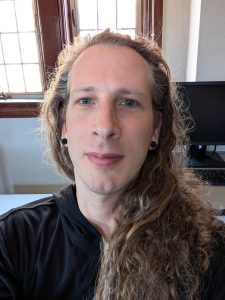
May 2025 — The Coalition for Academic Scientific Computation (CASC) and the Linux Clusters Institute (LCI) are pleased to announce Graham McEvily, System Administrator for the Computer Science Department at Rhodes College in Memphis, Tennessee, as the 2024 recipient of the CASC Charlie Bender Scholarship.
Graham attended the LCI Intermediate Workshop earlier this year, joining a select group of professionals from across the country for hands-on technical training and peer exchange in high-performance computing (HPC). The scholarship honors the legacy of CASC co-founder Charlie Bender and supports the professional growth of HPC system administrators at emerging and under-resourced institutions.
Since May 2024, Graham has worked with faculty at Rhodes to manage and upgrade the department’s National Science Foundation-funded research computing cluster, which contributes to the OSG Open Science Pool. His work is helping to modernize the cluster environment—shifting from proprietary management software and an end-of-life operating system to a fully open-source, sustainable infrastructure.
“As someone new to HPC and academic research computing, I was thankful to learn about the Linux Clusters Institute through colleagues in the Tennessee Research Computing and Data (TN-RCD) Consortium, and I am grateful to the Charlie Bender Scholarship program for making the workshop accessible,” Graham said.
Reflecting on his experience at the LCI Intermediate Workshop, Graham noted:
“It was extraordinary to spend a week immersed in classes, lab testing, and discussion with experienced instructors and co-attendees. Each subject was covered with a depth and breadth that feels like a solid basis and roadmap for future directions in study or training. I appreciated hearing from the broad range of experiences in the room and feel like I have a better understanding of explicit and implicit standards in the field.”
He added, “I look forward to applying what I learned about system, network, and scheduler monitoring to our recent cluster overhaul and hope to share this knowledge in support of students, staff, and faculty—as well as through continued collaboration with others in the region.”
Richard Knepper, CASC Chair and director of the Cornell University Center for Advanced Computing, emphasized the selection committee’s enthusiasm for Graham’s application: “Graham demonstrated a high level of initiative and commitment to advancing research computing infrastructure at Rhodes College. The CASC and LCI committee saw clear potential for future leadership in this field, due to his early contributions to an NSF-funded cluster and involvement in the OSG Open Science Pool.”
Lavanya Podila, program manager at the Linux Clusters Institute, highlighted the significance of the award: “Our selection of Graham, like past recipients, is based on his professional trajectory and his hands-on role in advancing cyberinfrastructure at a smaller institution. The LCI workshop provides the kind of intensive, community-centered training that helps equip rising HPC professionals like Graham to thrive and lead.”
With support from the scholarship and skills gained at the workshop, Graham hopes to secure institutional funding to attend the LCI Advanced Workshop in the future.
The CASC Charlie Bender Scholarship is awarded annually to provide financial support for system administrators from smaller or under-resourced institutions to attend LCI training workshops. The scholarship covers travel, lodging, registration, and meals.
To apply to the Charlie Bender Scholarship, please contact Kathryn Kelley at kelley@casc.org
About the Coalition for Academic Scientific Computation (CASC): The Coalition for Academic Scientific Computation (CASC) is an educational non-profit 501(c)(3) organization focused on advanced computing technology in the 21st century. We are composed of over 100 partner institutions with a shared mission of accelerating scientific discovery and developing a diverse workforce. Together, like-minded individuals and universities form a passionate community to support research computing and data. More information is available at https://casc.org.
About the Linux Clusters Institute: LCI is providing education and advanced technical training for the deployment and use of computing clusters to the high performance computing community worldwide. Founded in 1998, it includes some of the world’s foremost specialists in building and deploying clustered high-performance computing systems. LCI is the premier international forum to share information on management, administration, and advanced computing techniques for high performance cluster computing. More information is available at http://linuxclustersinstitute.org.
